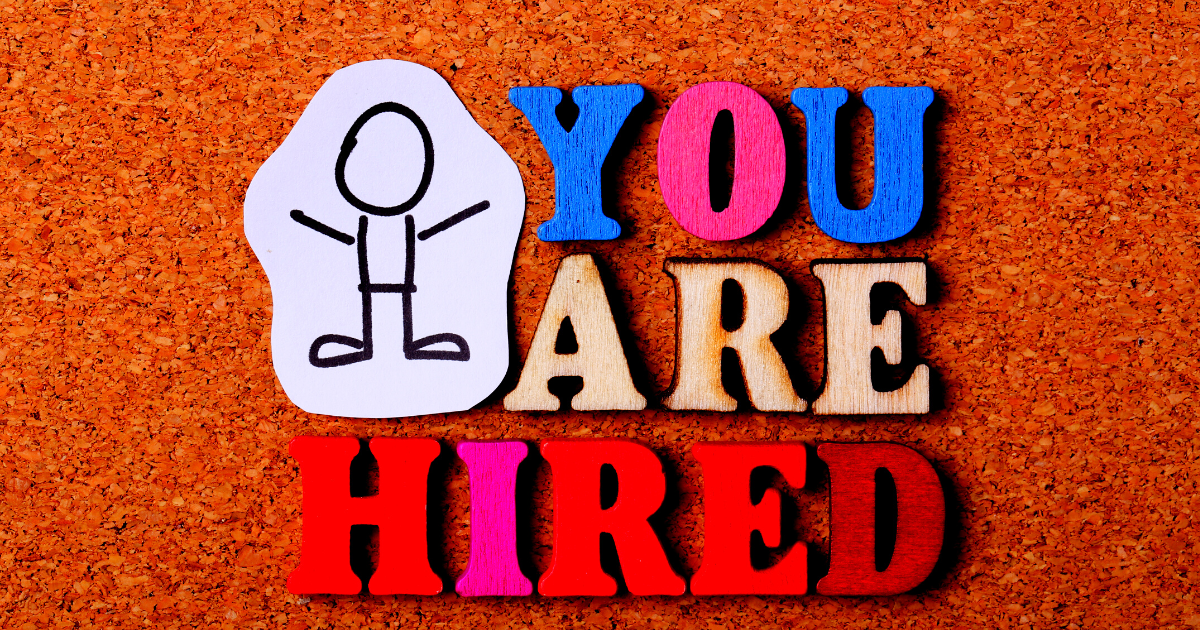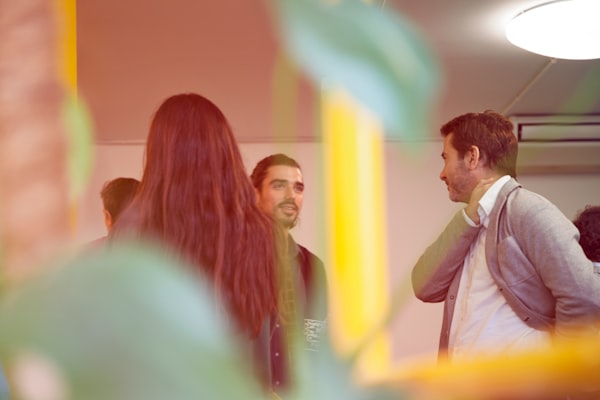“I’ve learned that people will forget what you said, people will forget what you did, but people will never forget how you made them feel.”
— Maya Angelou
Your communication skills define how others feel around you. They are vital both for your personal and professional life.
Your dream job often depends on the soft skills you show during the interview.
In fact, 93% of employers consider soft skills an “essential” or “significant” factor in hiring decisions.
It makes sense; most hard skills can be learned and polished during the working process.
Poor communication usually takes longer to fix. Fitting into the company culture can be challenging.
So, how to convince your future employer that you have the qualifications and communication skills for your dream job?
Let’s talk it about today.
I have some tricks to help you get hired because of outstanding communication.
What does “good communication” even mean?
I like a definition I found in Coursera:
“Effective communication is the process of exchanging ideas, thoughts, opinions, knowledge, and data so that the message is received and understood with clarity and purpose. When we communicate effectively, both the sender and receiver feel satisfied.”
Let’s dig a bit deeper.
To show who you are and what you know in an hour or two is hard.
The challenge is that you have limited time to demonstrate all of your skills during the interview.
So, before we focus on how to demonstrate them, let’s explore what your audience seeks from you.
What kind of communication skills your future employer craves?
I am not an HR, but I have interviewed a lot in the last eight years. I sat together with 100+ colleagues in three companies across three continents to assess candidates for various projects and positions.
The hiring decisions we made always factored in:
- Our candidates’ ability to express their motivation and expectations clearly
- Their listening and bonding skills
- Their ability to give, accept and adapt based on feedback
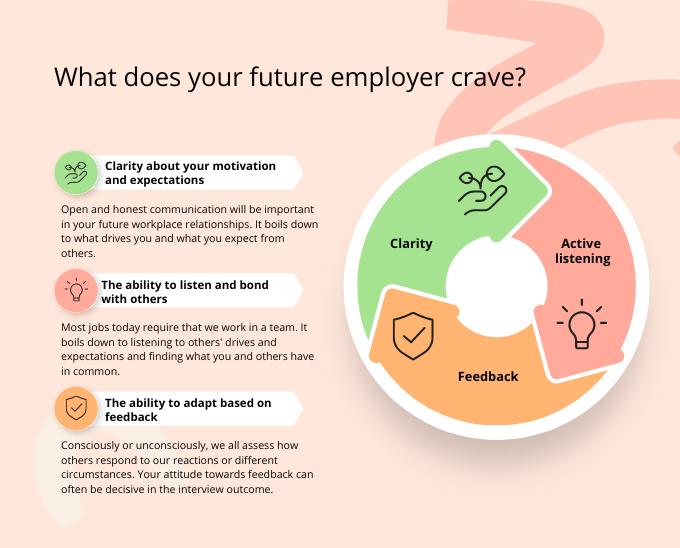
Your future employer might assess those skills unconsciously.
Still, there is a high chance of getting hired if you are clear, a good listener, and a feedback ninja.
I will give you tips and tricks to show these skills consistently during the interview.
We start with the first one – demonstrating clarity.
How to demonstrate clarity about your motivation and expectations?
To be clear about your motivation and expectations means to be concise and aware of your choices.
There are a couple of tips I discovered highly effective in showing this during an interview.
Check them below.
Tip #1: Try to keep your answers to the questions under three minutes
It’s an excellent way to demonstrate clarity and benefit from your time.
It’s simple math.
If you keep your answers under three minutes in a 60 mins interview, you have time for 20 questions.
Every question is a chance to shine with your experience, knowledge, and passion for the job.
Tip #2: Share why you chose your profession
Do you love problem-solving? Are you fascinated with numbers? Do you like helping people?
I recommend you share this early in the conversation.
Your inner drive is an excellent start to your short introduction or the answer to the question, “Tell us a bit about yourself.”
Keep it short – up to one sentence.
An example would be: “Well, I have always loved problem-solving, so I decided to become an engineer.”
Tip #3: Share why you’d work for this company
Research your future employer.
Tell them why you’re on this interview and what you hope to find in working with them.
Think about your previous employers. What made you stay? What made you leave?
What caught your attention while researching this company?
It’s an excellent finish to your short introduction or the answer to the question, “Tell us a bit about yourself.”
An example would be:
“I saw you’re a company that takes its social impact seriously. I want to put my skills into building sustainable products and deepen my expertise in the field.”
How to demonstrate that you can listen and bond with others?
The interview is a conversation.
You have only so much time to make the other side feel part of it. Use it wisely.
Make sure you create an experience for your interviewers too.
Listen to understand their motivation and expectations as well.
I offer a couple of tips below.
Tip # 1: Be curious. Don’t interrupt. Pay extra attention to the standard questions.
Interviews are full of standard questions.
It might be annoying, but I assure you cliches are there for a reason. They give a consistent structure to assess all candidates as objectively as possible.
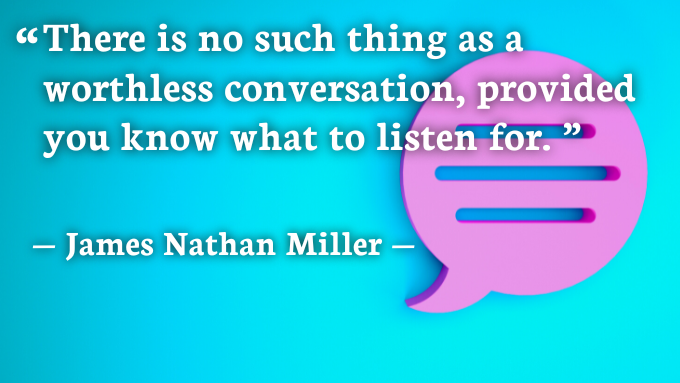
Good interviewers will try to ask those in a conversational style.
Be curious about their style.
Don’t interrupt, especially not with your ready answer.
Tip #2: Show and tell how you feel about all the questions. Be open.
There are three types of questions the interviewers ask:
- Standard questions – it’s enough to smile and nod when you hear them.
- Interesting questions – smile and start your answer with something like: “I really like this question!” “What an interesting question!”
- Hard questions – show your thoughtful expression. Admit this question is tricky, and you need some time to think.
Emotional honesty about the questions creates an experience for your interviewer.
It gives them information about both your knowledge and how good they are at getting to it.
At the very least, it will keep them engaged, especially if they interviewed five people before you.
Most of them will appreciate your openness and honesty.
Tip #3: Take a small pause before answering the questions
Count slowly to 2 in your head. Then answer the question. It gives the impression you listen closely. It also creates an image that you are a thoughtful and introspective person.
Tip #4: Ask your questions and include the words your interviewer said
Most interviews will have dedicated time for you as a candidate to ask questions.
Ask your questions in a way that reflects what your interviewer said.
The formula is: “You mentioned this, so I am curious to know more about this in terms of …”
It will show that you listened and understood the company as much as possible for the limited time you spent together.
How to demonstrate you can adapt based on feedback?
Active listening and feedback are tightly related.
Remember, the interview is a conversation where complete strangers need to quickly adapt to each other and reach a conclusion.
You want to conclude if this job will be good for you.
The interviewers want to conclude if you will be good for this job.
If you actively help them adapt to the conversation, you will win an enormous advantage.
Here are my tips on how.
Tip #1: “Did I answer your question?”
Asking your interviewer if you answered their question is so obvious and yet so powerful technique.
By using it, you will show, without the need to tell, that you care deeply about feedback.
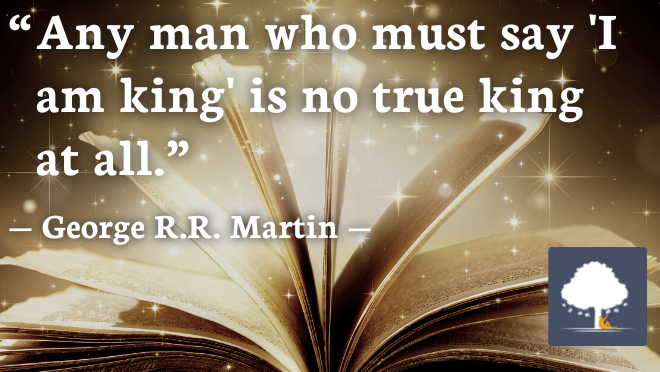
Use this technique at least a couple of times during the interview.
It is a solid finish when answering “the soft” questions about your motivation, personality, and preferences.
Listen and follow up based on the answer you received.
Don’t overdo it.
In the hard skills assessment part, you can be sure that you provided the objectively correct answers to most of the questions.
I trust your knowledge and experience there.
When you’re not sure about the correct answers, though, I offer you another superpower.
Tip #2: “I am not really sure, but I am curious to learn the answer.”
“I don’t know, but I want to learn” is how you win your interviewers’ hearts.
In real life, nobody has all the answers. Some bosses pretend they do, though. I suggest you avoid working with those.
You, being willing to fill in a gap in your knowledge during the interview, shows you are eager to learn from others.
This is all feedback is about.
Tip #3: Close the interview with specific feedback, even if you don’t receive one right away.
People will remember how you made them feel. Make it memorable.
Don’t thank them for their time; thank them for the experience they provided.
Share how it felt at the beginning of the interview and what you learned during it.
If the interviewers impressed you with their punctuality or the atmosphere they created, share it.
Avoid mentioning any thoughts on how you performed.
You need to appreciate your interviewers’ effort, especially if you felt good while talking to these people.
A good example would be:
“This was a great experience for me. In the beginning, I was nervous, but you made it easy for me to relax. I found question X very interesting – it got my brain working. I learned more about topic X. All in all – thank you for this conversation. Looking forward to hearing from you.”
It’s the last chance you have to leave a positive impression and get hired. Don’t miss the opportunity.
In conclusion
Effective communication in an interview is a skill like any other.
Interviews are a great way to practice your soft skills.
You need to convince people to trust you quickly. This is hard, and you might get a few rejections on the way.
I want to tell you something I say to every candidate I interview.
An interview does not define who you are, what you know, or your potential to learn.
It’s just a tiny bit of who you seemed to be for that brief moment of time.
An interview is only a subjective evaluation of what you demonstrated for an hour or two.
Keep that in mind if you get rejected.
Keep that in mind if you get hired.
Stay Awesome,
Diana

